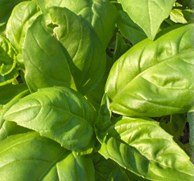Basil
The herb Sweet Basil (Ocymum Basilicum) is so called because "the smell thereof is fit for a king's house." It grows commonly in our kitchen gardens, but in England it dies down every year, and the seeds have to be sown annually. Botanically, it is named "basilicon," or royal, probably because used of old in some regal unguent, or bath, or medicine.
Added Jun 12, 2010
| 7,704 Reads
This, and the wild Basil, belong to the Labiate order of plants. The leaves of the Sweet Basil, when slightly bruised, exhale a delightful odour; they gave the distinctive flavour to the original Fetter-Lane sausages. The Wild Basil (Calamintha clinopodium) or Basil thyme, or Horse thyme, is a hairy plant growing in bushy places, also about hedges and roadsides, and bearing whorls of purple flowers with a strong odour of cloves. The term Clinopodium signifies "bed's-foot flower," because "the branches dooe resemble the foot of a bed." In common with the other labiates, Basil, both the wild and the sweet, furnishes an aromatic volatile camphoraceous oil. On this account it is much employed in France for flavouring soups (especially mock turtle) and sauces; and the dry leaves, in the form of snuff, are used for relieving nervous headaches. A tea, made by pouring boiling water on the garden basil, when green, gently but effectually helps on the retarded monthly flow with women. The Bush Basil is Ocymum minimum, of which the leafy tops are used for seasoning, and in salads. The Sweet Basil has been immortalised by Keats in his tender, pathetic poem of Isabella and the Pot of Basil, founded on a story from Boccaccio. She reverently possessed herself of the decapitated head of her lover, Lorenzo, who had been treacherously slain:— "She wrapped it up, and for its tomb did choose The herb was used at funerals in Persia. Its seeds were sown by the Romans with maledictions and curses through the belief that the more it was abused the better it would prosper. When desiring a good crop they trod it down with their feet, and prayed the gods it might not vegetate. The Greeks likewise supposed Basil to thrive best when sown with swearing; and this fact explains the French saying, Semer la Basilic, as signifying "to slander." It was told in Elizabeth's time that the hand of a fair lady made Basil flourish; and this was then planted in pots as an act of gallantry. "Basil," says John Evelyn, "imparts a grateful flavour to sallets if not too strong, but is somewhat offensive to the eyes." Shenstone, in his School Mistress's Garden, tells of "the tufted Basil," and Culpeper quaintly says: "Something is the matter; Basil and Rue will never grow together: no, nor near one another." It is related that a certain advocate of Genoa was once sent as an ambassador to treat for conditions with the Duke of Milan; but the Duke harshly refused to hear the message, or to grant the conditions. Then the Ambassador offered him a handful of Basil. Demanding what this meant, the Duke was told that the properties of the herb were, if gently handled, to give out a pleasant odour; but that, if bruised, and hardly wrung, it would breed scorpions. Moved by this witty answer, the Duke confirmed the conditions, and sent the Ambassador honourably home. * Basil Aromatherapy Essential Oil
Added Jun 12, 2010
| 7,704 Reads
Share The Magic ...
The GoE MONEY!!! Course - A Course In Real MONEY MAGIC!
|





















